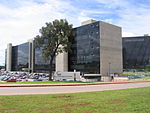Superior Court of Justice (Brazil)

The Superior Court of Justice (Portuguese: Superior Tribunal de Justiça, also known as STJ, IPA: [ˌɛsiteˈʒɔtɐ]) is the highest appellate court in Brazil for non-constitutional questions of federal law. The STJ also has original jurisdiction over some cases. Its competence is described in Article 105 of the Brazilian Constitution of 1988. A Special Appeal (in Portuguese, Recurso Especial) can be made to this court when a judgement of a court of second instance offends a federal statutory provision or when second instance courts have issued different interpretations of the same federal statute. By rule, the STJ decides only questions of law, not any questions of fact and the probatory elements on the case, about which the Second Instance Courts give the last word. As in other superior courts in Brazil, STJ's justices are called "ministers" (Portuguese: ministros), not to be confused with ministers from the executive branch.
Excerpt from the Wikipedia article Superior Court of Justice (Brazil) (License: CC BY-SA 3.0, Authors, Images).Superior Court of Justice (Brazil)
SAFS, Brasília
Geographical coordinates (GPS) Address External links Nearby Places Show on map
Geographical coordinates (GPS)
| Latitude | Longitude |
|---|---|
| N -15.808333333333 ° | E -47.867222222222 ° |
Address
Superior Tribunal de Justiça
SAFS
70070-600 Brasília
Federal District, Brazil
Open on Google Maps









